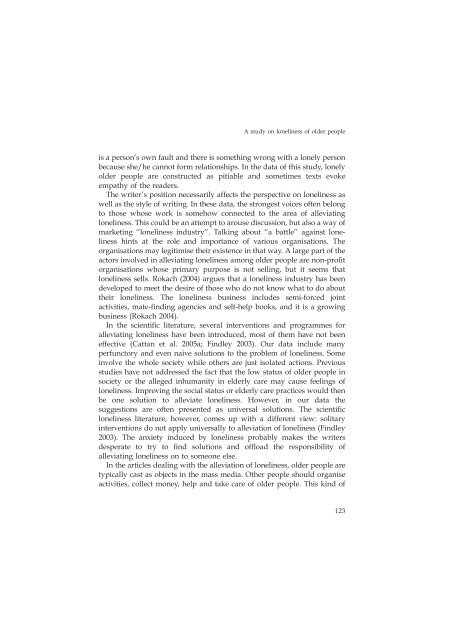Avaa tiedosto - TamPub - Tampereen yliopisto
Avaa tiedosto - TamPub - Tampereen yliopisto
Avaa tiedosto - TamPub - Tampereen yliopisto
You also want an ePaper? Increase the reach of your titles
YUMPU automatically turns print PDFs into web optimized ePapers that Google loves.
A study on loneliness of older people<br />
is a person’s own fault and there is something wrong with a lonely person<br />
because she/he cannot form relationships. In the data of this study, lonely<br />
older people are constructed as pitiable and sometimes texts evoke<br />
empathy of the readers.<br />
The writer’s position necessarily affects the perspective on loneliness as<br />
well as the style of writing. In these data, the strongest voices often belong<br />
to those whose work is somehow connected to the area of alleviating<br />
loneliness. This could be an attempt to arouse discussion, but also a way of<br />
marketing ‘‘loneliness industry’’. Talking about ‘‘a battle’’ against loneliness<br />
hints at the role and importance of various organisations. The<br />
organisations may legitimise their existence in that way. A large part of the<br />
actors involved in alleviating loneliness among older people are non-profit<br />
organisations whose primary purpose is not selling, but it seems that<br />
loneliness sells. Rokach (2004) argues that a loneliness industry has been<br />
developed to meet the desire of those who do not know what to do about<br />
their loneliness. The loneliness business includes semi-forced joint<br />
activities, mate-finding agencies and self-help books, and it is a growing<br />
business (Rokach 2004).<br />
In the scientific literature, several interventions and programmes for<br />
alleviating loneliness have been introduced, most of them have not been<br />
effective (Cattan et al. 2005a; Findley 2003). Our data include many<br />
perfunctory and even naive solutions to the problem of loneliness. Some<br />
involve the whole society while others are just isolated actions. Previous<br />
studies have not addressed the fact that the low status of older people in<br />
society or the alleged inhumanity in elderly care may cause feelings of<br />
loneliness. Improving the social status or elderly care practices would then<br />
be one solution to alleviate loneliness. However, in our data the<br />
suggestions are often presented as universal solutions. The scientific<br />
loneliness literature, however, comes up with a different view: solitary<br />
interventions do not apply universally to alleviation of loneliness (Findley<br />
2003). The anxiety induced by loneliness probably makes the writers<br />
desperate to try to find solutions and offload the responsibility of<br />
alleviating loneliness on to someone else.<br />
In the articles dealing with the alleviation of loneliness, older people are<br />
typically cast as objects in the mass media. Other people should organise<br />
activities, collect money, help and take care of older people. This kind of<br />
123














